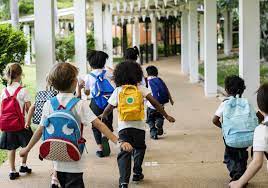Children typically start kindergarten around the age of 5 in many countries. Kindergarten serves as a foundational year before formal primary education begins. The exact age and guidelines for starting kindergarten can vary from one region to another, but here are some general guidelines and readiness factors to consider:
Age Guidelines: Most children start kindergarten between the ages of 4 and 6, depending on the country’s educational system and cut-off dates for enrollment. In the United States, for example, children often start kindergarten at the age of 5 or 6, depending on when their birthday falls.
Readiness Factors: Readiness for kindergarten goes beyond a specific age and takes into account a child’s social, emotional, cognitive, and physical development. Here are some factors to consider:
- Social and Emotional Skills: Children should be able to interact with peers, share, take turns, and follow simple instructions. Emotional maturity, such as the ability to manage feelings and cope with separation from parents, is also important.
- Communication Skills: Children should have basic language skills, including the ability to express themselves, understand others, and follow simple conversations.
- Fine Motor Skills: Kindergarten involves activities that require fine motor skills, such as holding a pencil, using scissors, and manipulating small objects.
- Basic Literacy and Numeracy: While not all children will have full reading and maths skills, exposure to letters, numbers, and basic concepts can be beneficial.
- https://sumhelath.com/wp-admin/post.php?post=946&action=edit
- Curiosity and Eagerness to Learn: Children who show an interest in exploring new things, asking questions, and engaging in learning activities are often more prepared for kindergarten.
- Independence: Kindergarten requires a level of independence, such as being able to manage personal belongings, use the restroom independently, and follow routines.
- Attention Span: Children should be able to focus on activities and follow instructions for a reasonable amount of time.
Preparation: To help your child prepare for kindergarten, consider these steps:
- Reading and Talking: Engage in conversations and read books together to enhance language skills.
- Play and Socialization: Encourage playdates and group activities to help your child develop social skills and learn to cooperate with others.
- Fine Motor Activities: Practice activities that enhance fine motor skills, such as drawing, colouring, and using playdough.
- Routines: Establish a daily routine that includes regular sleep schedules, meals, and playtime.
- Basic Skills: Introduce basic concepts like colours, shapes, letters, and numbers through games and everyday experiences.
- Independence: Encourage your child to perform simple tasks independently, like dressing themselves and tidying up.
- Visit the School: If possible, visit the kindergarten with your child before their first day to familiarise them with the environment.
Remember that every child develops at their own pace, and readiness for kindergarten can vary. If you have concerns about your child’s readiness, you can consult with educators or professionals who specialise in early childhood development.



